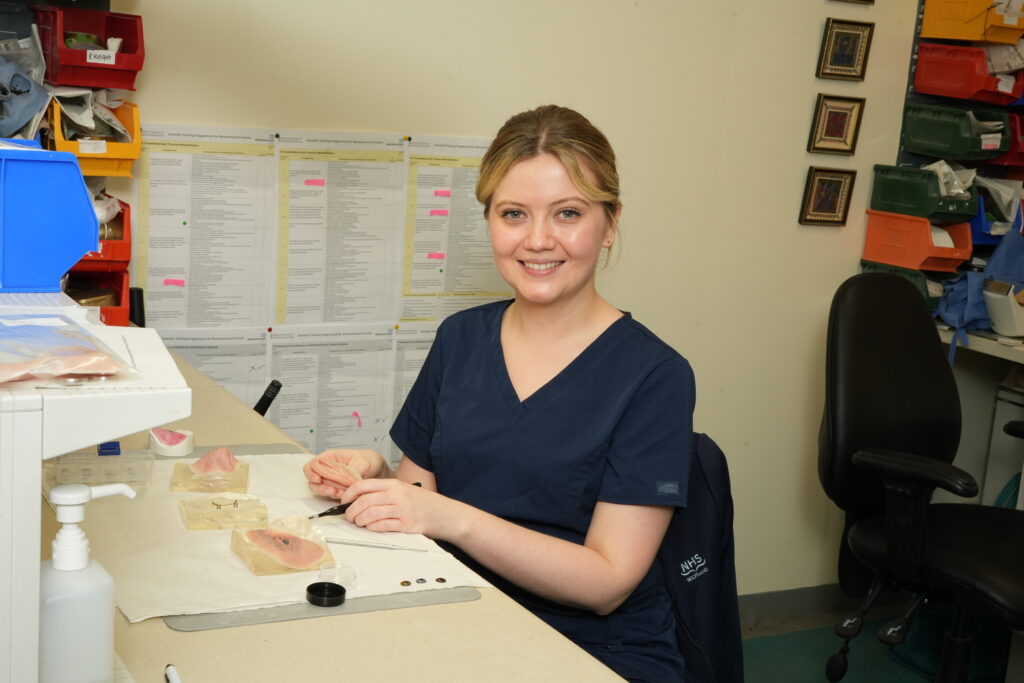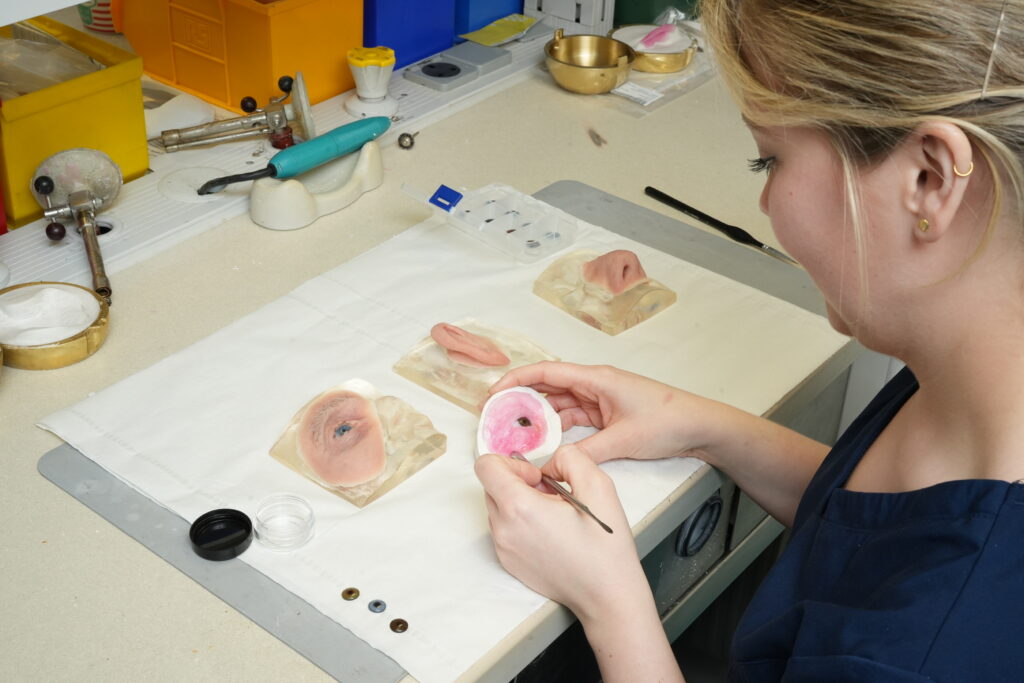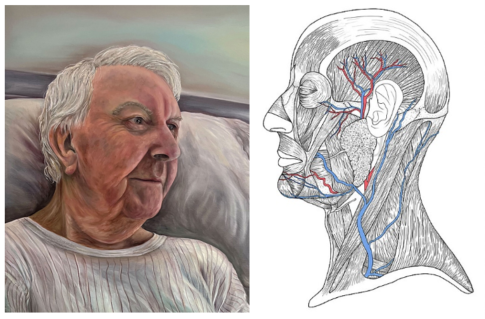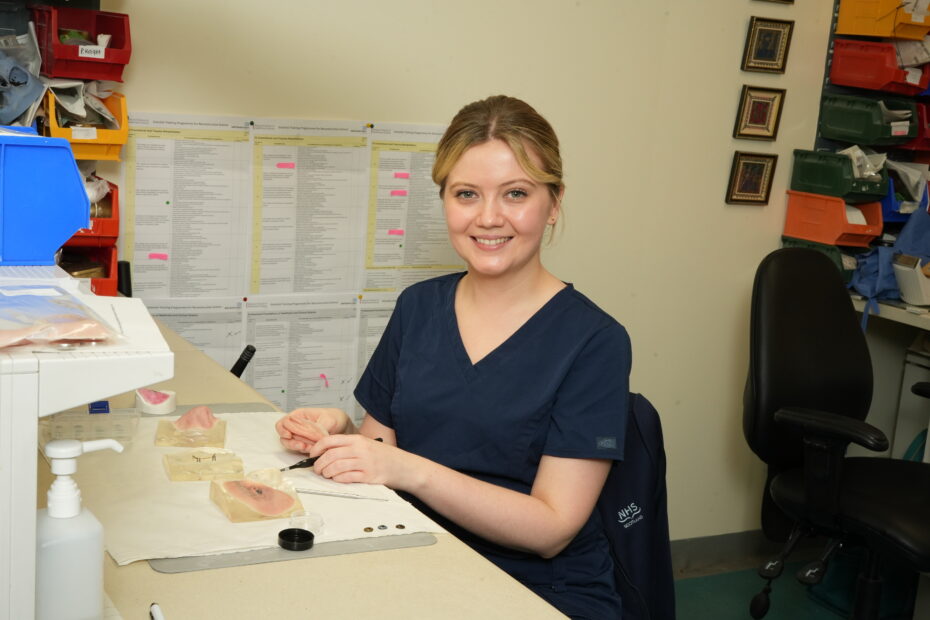
A member of staff at NHS Greater Glasgow and Clyde has turned her back on making a name for herself in Fine Arts, so she can use her talents to rebuild the lives of patients who have suffered cancer or trauma.
Danielle Adair is a Trainee Reconstructive Scientist in the Maxillofacial Laboratory at the Queen Elizabeth University Hospital in Glasgow, a job that she dreamed of from the time she was at school – even though back then she didn’t know it existed.
“Growing up I loved science and art,” said the 28-year-old, originally from Bangor Co. Down near Belfast but now living in Paisley. “I really wanted to do science, and I was in two minds about which I should choose.
“My dad wanted me to do science too, but I chose art, and studied Fine Art for three years at Cardiff Metropolitan University.”
Danielle had always known she wanted to help people, to use her talents for others.
“When I heard about Maxillofacial Prosthetics, I knew it was for me.
“It’s a job that lets me do something that improves someone’s life, for the rest of their life.”
Maxillofacial Prosthetics is the practice of rehabilitating patients who have lost a facial feature or other areas of the body due to cancer, trauma or a congenital condition with a maxillofacial prosthesis.

To get her training post, Danielle was one of the first students in Scotland to benefit from the Scientific Training Programme (STP) to study a Masters degree in Reconstructive Science. But it was no easy process. On graduating from Cardiff, Danielle did a Masters in Forensic Art and Patient Identification at Dundee University.
She said: “During this time I learnt how forensic art could help identify the faces of the dead for newspapers etc, and this degree was really interesting, however I knew I wanted to help the faces of the living.”
In order to pursue a career in Maxillofacial Prosthetics the next step was to obtain a degree in Dental Technology as it is an essential criteria for the job, and that meant studying with the University of Worcester while working in various dental laboratories in Birmingham.
Eventually she was able to apply for the job at NHS Greater Glasgow and Clyde and, after a “bench test” – where she was able to show that she had what it took to do the job – she was successful.
“I’m halfway through my three-year Masters degree, and I love it,” she said. “I love the patients and the people I work with.
“I need to spend a lot of time with patients so I get to build a real rapport with them. It’s hard to describe how satisfying it is to help them, just so they feel they can leave the house again, or see their kids or grandkids.”
At the end of her training, Danielle hopes she’ll be able to continue working in the Maxillofacial Laboratory, as she sees it as the ultimate extension of her skills.
“Prosthetics is taking art to the next level. I’m sculpting and painting things that are completely unique, so it’s a wonderful challenge for me. We paint every eye ourselves and sculpt every ear and nose by hand.
“And every day is different. I work with people who have suffered cancer or trauma, really devastating illnesses or injuries, and I help them to rebuild their lives.”
Unlike many artists with a talent like hers, Danielle has no interest in getting her work noticed – just the opposite in fact.

“This is hidden artwork,” she said, “and that’s just the way I like it. The better I do it, the fewer people will know it’s there. I want my work to be part of the people I help – to be truly invisible.”
Pauline Paul, Consultant Maxillofacial Prosthetist/Clinical Reconstructive Scientist (Lab Manager), said: “Danielle is the first Reconstructive Science Trainee we have had at the Maxillofacial Laboratory through the Scientific Training Programme thanks to funding from NES [NHS National Education for Scotland] and we are so lucky to have her.
“She is dedicated and has everything we need with an obvious flair for art and science, and an ability to make patients feel at ease during their appointments.
“Reconstructive science is only one of a wide range of careers and roles in Healthcare Sciences which all make a huge difference to patients’ lives.”
Danielle added: “I’m so happy I’ve found this career. But it’s almost like it’s not just for me. I would love nothing more than to say to a 16-year-old like me – someone not sure where art can take them beyond painting and sculpture – ‘this is what you can do. Never give up on what you really want’.”
Sadly, Danielle’s dad, Alan, died of cancer last year at the age of 62, and while that comes with great sadness for her, she finds some solace in the fact he saw her do so much with her talents.
“My dad was my cheerleader in everything I did and I’m glad he knew I got this post,” she said. “He was so proud of me for chasing my dream and wanting to help others with my artistic abilities to get their lives back after what cancer or trauma took away from them.”
To find out more about working in Maxillofacial Prosthetics, go to: IMPT education – IMPT

